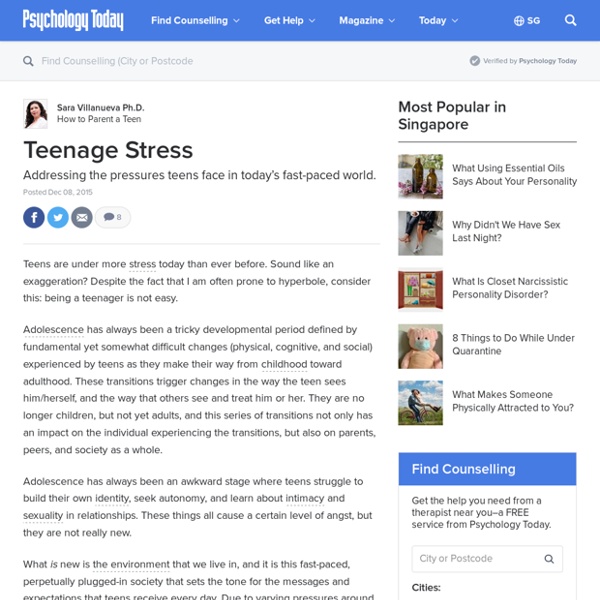What is teenage stress?
Teenage stress: what is it? Stress in teenagers – and anyone – can be unpleasant, but it’s not necessarily a bad thing. Stress is the way your body responds to challenges and gets you ready to face them with attention, energy and strength.
Stress and teenagers - ReachOut Parents
It’s very common for young people to feel stressed out from time to time. Stress is a normal part of life and can even be beneficial in some situations. However, if you’re worried that your child is under a lot of stress and it’s been going on for a while or is affecting their everyday life, there are things you can do to help them. This article can help if you want to: learn about the causes of stress and how stress affects teens be able to spot the signs of stress in your child help your child manage stress more effectively. Young people and stress
Why are teenagers more stressed than ever?
Parents might be mindful of buffering their own stress from their teens. True, the parental brain has evolved to scan the environment for threats. But if parents pass on their stress, children can become overly stress-reactive, vigilant, and stress-sensitive. On the other hand, passing on constructive coping strategies is helpful.
Stress
External sources of stress could include: Personal problemsWork problemsRelationship difficultiesPressure of studiesHealth problemsFinancial crisisUnemploymentLosses, e.g. bereavementUnexpected newsDaily hassles Internal sources of stress could include the following: Thinking stylesNegativity: "I'm useless, a loser, a failure."
Keep your stress under control
Feeling like there are too many pressures and demands on you? Losing sleep worrying about tests and schoolwork? Eating on the run because your schedule is just too busy? You're not alone.
Stress
[1] Centre for Studies on Human Stress. Recipe for Stress: Retrieved on 4 Apr 2018 from: [2] Segerstrom SC & Miller GE (2004) Psychological Stress and the Human Immune System: A Meta-Analytic Study of 30 Years of Inquiry.
The basics of stress
Stress is a situation that triggers a particular biological response. When you perceive a threat or a major challenge, chemicals and hormones surge throughout your body. Stress triggers your fight-or-flight response in order to fight the stressor or run away from it. Typically, after the response occurs, your body should relax. Too much constant stress can have negative effects on your long-term health.
Signs You’re Too Stressed Out
Some stress is normal, but too much of it isn’t. What are the warning signs of stress that tell us we’re overly stressed out? There’s No Avoiding Stress We can’t avoid certain stressful situations: never-ending deadlines, your child’s PSLEs, increasing cost of living ($2 for a prata? Daylight robbery!), and an MRT breakdown that derails your entire day.
Quiz on stress levels
Is there too much stress in your life? To find out, take this quiz, adapted from a scale developed by Peter Lovibond at the University of New South Wales. For the first 16 questions, please indicate how much each statement applied to you over the past week.
When Stress Is Actually Good for You
We rarely hear people say, "I'm really feeling stressed. Isn't that great?" But if we didn't have some stress in our lives—the "good stress" variety—we'd feel rudderless and unhappy. If we define stress as anything that alters our homeostasis, then good stress, in its many forms, is vital for a healthy life. Bad stress can even turn into good stress, and vice versa.1 Good Stress vs.
More teens in Singapore seeking help for school stress
SINGAPORE (THE NEW PAPER) - More teenagers from top schools are seeking help at the Institute of Mental Health (IMH) for school-related stress. IMH said that stress-related, anxiety and depressive disorders are common conditions seen at its Child Guidance Clinics, which treat children aged six to 18. The clinics saw an average of about 2,400 new cases every year from 2012 to 2017.
5 Tips for Helping Teens Cope with Stress
The American Psychological Association (APA) recently released its Stress in America report (the full report can be found here). This year the report highlighted the stress experienced by American youth (ages 13-17) stating "high stress and ineffective coping mechanisms appear to be ingrained in our culture." Since the survey has begun, it has continued to find that American adults report higher stress levels than what they believe to be healthy. For example, recent results indicated that adults report that stress impacts their physical health (30 percent) and mental health (33 percent). This APA report continues to drive home one important message, “We need to improve our health system to equally address both physical and mental health.” article continues after advertisement
The impact of stress on students
Methods A single author (MP) searched PubMed and Google Scholar for peer-reviewed articles published at any time in English. Search terms included academic, school, university, stress, mental health, depression, anxiety, youth, young people, resilience, stress management, stress education, substance use, sleep, drop-out, physical health with a combination of any and/or all of the preceding terms. A snowball strategy allowed for examination of references in identified articles, and inclusion of additional articles as appropriate. The author reviewed all potential articles for inclusion.



